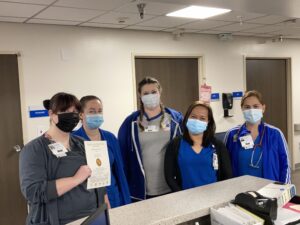By Melissa Grych
When a stroke strikes, the amount of time from the onset of symptoms to medical care is a critical window. The faster medical attention is received, the more treatment options are available and the less chance of disability. Yet, people often delay going to the hospital.

Photos courtesy of White Rock Medical Center
“In stroke care, every minute counts. If brain tissue dies, you can never get it back,” explains Crystal Conwell, BSN, RN, VA-BC, stroke coordinator at White Rock Medical Center, a Joint Commission Primary Stroke Center. “Today there are more ways to treat a stroke, such as clot-busting medications. And there are more ways to help the recovery process with rehabilitation and education you need to live a healthy life.” Conwell said there are common reasons why people delay care for a possible stroke. Follow her expert advice instead.
1. Dr. Google
While the Internet is a wonderful resource, it also can create a false sense of expertise. A web search for a certain symptom or problem can yield all kinds of results that do not factor your personal health history, risk factors, family health history, genetics, lifestyle choices and other contributing conditions. Don’t rely on the Internet to make medical decisions.
2. The symptoms aren’t new
Strokes can be preceded by less emergent symptoms or a series of “mini-strokes.” When someone experiences these warning signs but doesn’t experience a major medical issue or dramatic impact to quality of life, it can create a false sense of security that the symptoms were “no big deal.” However, recurring symptoms can indicate a more serious medical issue. Learn the signs and symptoms of a stroke and seek care right away if you suspect a stroke.
3. They are alone.
If you suspect a stroke, do not be afraid to call 911. Sometimes people in need of medical attention delay the care because they lack transportation, however a stroke is a potentially life-threatening emergency. When medical care for a stroke is delayed, it can cause loss of brain function or loss of healthy brain tissue. Seek help right away!
4. Lack of trust
It’s natural to hesitate about going to the doctor, but seconds count during a stroke. Before an emergency arises, find a hospital that is accredited in stroke care.

The Joint Commission, the national accrediting agency for hospitals, thoroughly reviews hospitals who apply for designation as an expert in stroke care. The Joint Commission completes an on-site visit that includes assessing stroke treatments, patient outcomes, clinical guidelines, staff education, patient education and other requirements.
5. They don’t know the signs of stroke
Know the signs and symptoms of a stroke. Time is critical. If you suspect a stroke, seek emergency medical attention right away to get life-saving care and medicine.
Remember BEFAST:
• Balance — Loss of balance, headache or dizziness
• Eyes — Blurred vision
• Face — One side of the face drooping
• Arms — Arms or leg weakness
• Speech — Slurred speech or difficulty speaking
• Time — Time. Call 911 immediately if you suspect a stroke!
Learn more about strokes and stroke symptoms at WhiteRockMedicalCenter.com/Stroke or visit the American Stroke Foundation at stroke.org.
